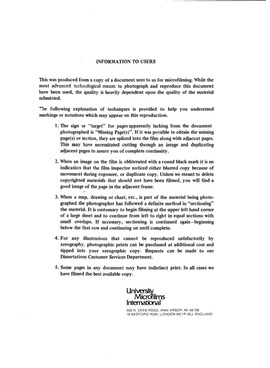| dc.contributor.author | Scruggs, Donald Lee, | en_US |
| dc.date.accessioned | 2013-08-16T12:27:59Z | |
| dc.date.available | 2013-08-16T12:27:59Z | |
| dc.date.issued | 1980 | en_US |
| dc.identifier.uri | https://hdl.handle.net/11244/4706 | |
| dc.description.abstract | The acquisition and use of information is a major source of political power. American presidents have been particularly adept information entrepreneurs, acquiring, investigating and monopolizing the information necessary for the creation and execution of national policy. Development and perfection of an elaborate system of advisors and advisory groups following World War II has been a principal means by which this monopoly has been achieved. Presidential advisory commissions are both a product of and a tool in the development of the presidential advisory system. The first part of this study establishes the advisory commission as an unique presidential public policy instrument. Particular attention is given to uses of advisory commissions as gatekeeping devices designed to thwart access to the White House policy making councils by presidentially defined "unrepresentative" interest groups. | en_US |
| dc.description.abstract | The analysis of the Johnson domestic policy making system undertaken in this study had three goals: to demonstrate the major contributions made by the Johnson administration to the development of the dominance of the presidency in the initiation and implementation of national domestic policy making; to analyze critically the use of task forces and commissions in the Johnson domestic policy making system; to substantiate the proposition discussed in Part IV that hegemonic rule by elites is a valid concept to use in describing the politics of the American presidential advisory system. | en_US |
| dc.description.abstract | The analysis of the Kerner Commission in this work had three objectives: provide evidence to support the thesis that presidential advisory commissions are effective tools for gaining presidential advantage over the other institutions and actors in national policy making in the acquisition and dissemination of information on contested policy issues; to reinforce the contention that the Johnson administration contributed significantly to this pattern of dominance; to provide a case study of the ability of non-established elites to obtain access to the public policy making system through presidentially established political channels. | en_US |
| dc.description.abstract | This study sought to accomplish four goals: to describe the political uses of ad hoc advisory groups in the advisory systems created by twentieth century American presidents; to detail the unique contributions of President Lyndon Baines Johnson to this pattern of political behavior; to advance an original interpretation of the work of one of Johnson's most important advisory groups, the National Advisory Commission on Civil Disorders (the Kerner Commission); to draw conclusions useful in enhancing the theoretical interpretation of the practice of American presidential politics. | en_US |
| dc.format.extent | ix, 555 leaves ; | en_US |
| dc.subject | Political Science, General. | en_US |
| dc.title | Lyndon Baines Johnson and the National Advisory Commission on Civil Disorders (the Kerner Commission) : | en_US |
| dc.type | Thesis | en_US |
| dc.thesis.degree | Ph.D. | en_US |
| dc.thesis.degreeDiscipline | Department of Political Science | en_US |
| dc.note | Source: Dissertation Abstracts International, Volume: 41-02, Section: A, page: 0790. | en_US |
| ou.identifier | (UMI)AAI8016932 | en_US |
| ou.group | College of Arts and Sciences::Department of Political Science | |
